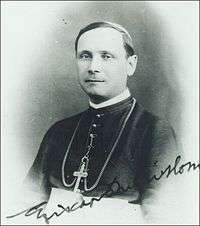Iuliu Hossu
| Iuliu Hossu Servant of God | |
|---|---|
|
Bishop of Cluj-Gherla Cardinal in pectore | |
 | |
| Church | Romanian Greek-Catholic Uniate Church |
| Diocese | Cluj-Gherla |
| See | Cluj-Gherla |
| Appointed | 21 April 1917 |
| Term ended | 28 May 1970 |
| Predecessor | Vasile Hossu |
| Successor | George Guţiu |
| Orders | |
| Ordination |
27 March 1910 by Vasile Hossu |
| Consecration |
3 March 1917 by Victor Mihaly de Apşa |
| Rank | Bishop |
| Personal details | |
| Birth name | Iuliu Hossu |
| Born |
30 January 1885 Milaș, Austria-Hungary |
| Died |
28 May 1970 (aged 85) Bucharest, Romania |
| Previous post |
|
| Sainthood | |
| Venerated in | Roman Catholic Church |
| Title as Saint | Servant of God |
| Attributes |
|
Iuliu Hossu (30 January 1885 - 28 May 1970) was a Romanian Greek-Catholic bishop of the Cluj-Gherla Diocese and later cardinal (never functioning) and victim of the Communist regime.[1] Pope Paul VI elevated Hossu to the rank of cardinal in pectore in 1969 but did not publish his appointment until 1973, after Hossu's death.
He was arrested by the Communist authorities on 28 October 1948. From 1950 to 1955 he was detained as political prisoner at Sighet prison. He spent the rest of his life under house arrest and died in 1970.
He is considered to have died in hatred of his faith and his canonization cause - as well as that of a larger group of martyrs - has been opened. He is referred to as a Servant of God.
Life
Early life and priesthood
Iuliu Hossu was born on 30 January 1885 in Milaș in Austria-Hungary to Ioan Hossu and Victoria Măriuţiu.
Hossu studied at the seminary of Cluj and later at the seminary of Budapest. He also studied at the University of Vienna in Austria and later at the Pontifical Urbanian Athenaeum in Rome, where he was to obtain doctorates in philosophy in 1906, and theology in 1908.
He was ordained to the priesthood on 27 March 1910 by Vasile Hossu, his uncle. He completed further studies for a year from 1910 to 1911 and served in the capacity of an archivist and a librarian. From 1911 to 1914, he served as the personal secretary to the Bishop of Gherla, and later as a military chaplain to the Romanian soldiers in the Austro-Hungarian Army during World War I between 1914 and 1917.
Episcopate and cardinalate
Pope Benedict XV appointed him as the Bishop of Gherla on April 21, 1917 and he received his episcopal consecration on 4 December 1917. He was named the Bishop of Cluj-Gherla when the see was transferred on 5 June 1930, and he was later appointed by Pope Pius XI as the Apostolic Administrator of Maramures from 1930 until a year after. Hossu was named an Assistant at the Pontifical Throne on 16 September 1936. He also was the Apostolic Administrator of Oradea Mare from 1941 until 1947 when appointed as such by Pope Pius XII.
For his opposition to the government he was forced to flee his diocese on 28 October 1948 but was arrested. He was confined at Jilava, Drogoslavele, Sighet, and Gherla from 1948 to 1964. He was relocated to a monastery near Bucharest from that point until 1970, and was transferred to a hospital there in May 1970.
On 28 April 1969 he was created as a cardinal but Pope Paul VI reserved Hossu in pectore. His elevation into the cardinalate was announced on 5 March 1973 after Hossu's death.
Death
Hossu died on 28 May 1970 at 9:00am at Coletina Hospital in Bucharest with Bishop Alexandru Todea at his side. He was buried in Bucharest, his last words recorded as being: "My struggle ends, yours continues". On 7 December 1982, his remains were exhumed and transferred.
Beatification process
The beatification process - which conferred the title Servant of God upon him - commenced with the declaration of "nihil obstat" (nothing against) to the cause on 28 January 1997. The diocesan process delved into his life by collecting documentation and testimonies, and was formally validated by the Congregation for the Causes of Saints on 18 February 2011.
Notes and references
| Wikimedia Commons has media related to Iuliu Hossu. |